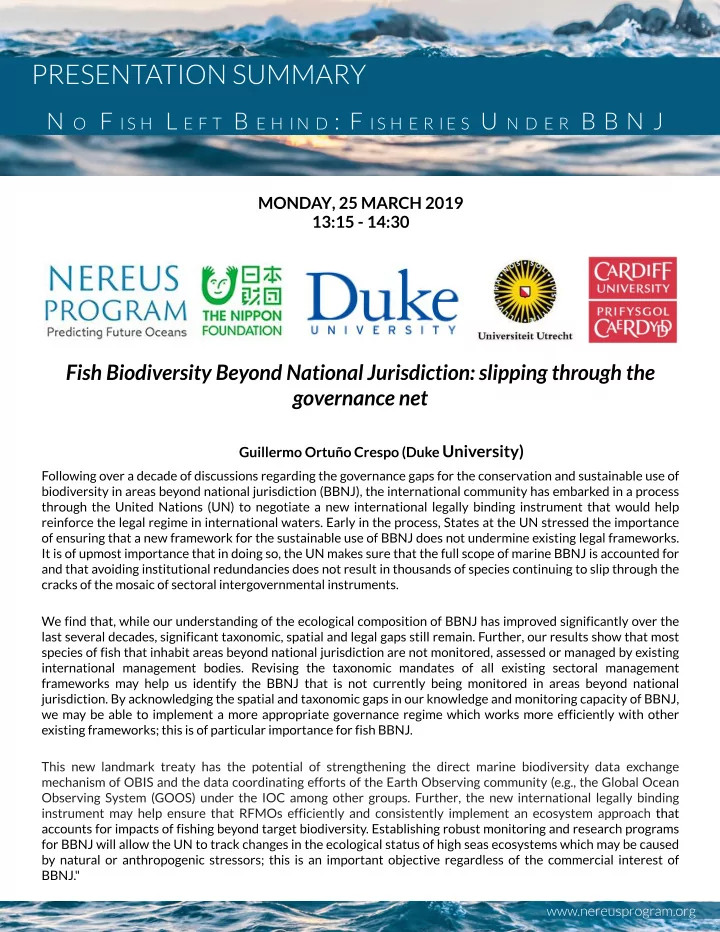

PRESENTATION SUMMARY N O F I SH L E F T B E H I N D : F I SH E R I E S U N D E R B B N J MONDAY, 25 MARCH 2019 13:15 - 14:30 Fis h Biodivers ity Beyond National J uris diction: s lipping through the governance net Guillermo Ortuño Crespo (Duke University) Following over a decade of discussions regarding the governance gaps for the conservation and sustainable use of biodiversity in areas beyond national jurisdiction (BBNJ), the international community has embarked in a process through the United Nations (UN) to negotiate a new international legally binding instrument that would help reinforce the legal regime in international waters. Early in the process, States at the UN stressed the importance of ensuring that a new framework for the sustainable use of BBNJ does not undermine existing legal frameworks. It is of upmost importance that in doing so, the UN makes sure that the full scope of marine BBNJ is accounted for and that avoiding institutional redundancies does not result in thousands of species continuing to slip through the cracks of the mosaic of sectoral intergovernmental instruments. We find that, while our understanding of the ecological composition of BBNJ has improved significantly over the last several decades, significant taxonomic, spatial and legal gaps still remain. Further, our results show that most species of fish that inhabit areas beyond national jurisdiction are not monitored, assessed or managed by existing international management bodies. Revising the taxonomic mandates of all existing sectoral management frameworks may help us identify the BBNJ that is not currently being monitored in areas beyond national jurisdiction. By acknowledging the spatial and taxonomic gaps in our knowledge and monitoring capacity of BBNJ, we may be able to implement a more appropriate governance regime which works more efficiently with other existing frameworks; this is of particular importance for fish BBNJ. This new landmark treaty has the potential of strengthening the direct marine biodiversity data exchange mechanism of OBIS and the data coordinating efforts of the Earth Observing community (e.g., the Global Ocean Observing System (GOOS) under the IOC among other groups. Further, the new international legally binding instrument may help ensure that RFMOs efficiently and consistently implement an ecosystem approach that accounts for impacts of fishing beyond target biodiversity. Establishing robust monitoring and research programs for BBNJ will allow the UN to track changes in the ecological status of high seas ecosystems which may be caused by natural or anthropogenic stressors; this is an important objective regardless of the commercial interest of BBNJ. " www.nereusprogram.org
Cooperating with exis ting ins titutions related to fis heries management Solène Guggisberg (Utrecht University) Some States argue that fisheries should not be included in the international legally binding instrument (ILBI) on biodiversity beyond national jurisdiction (BBNJ), as they are already covered by the UN Fish Stocks Agreement (UNFSA) and managed by other institutions, the regional fisheries management organizations (RFMOs). However, the relationship between fisheries and BBNJ is more complicated than this statement suggests. Even if fisheries were excluded from the ILBI, the impacts of fishing in the high seas will somehow have to be taken into account in order to reach the general aim of the future treaty, as well as in the practical implementation of that instrument. The overarching objective of the ILBI BBNJ is to ensure the conservation and sustainable use of BBNJ, hence protecting the interests of all States. However, the governmental stakeholders that are involved in the international fisheries regime do not represent the interests of all States. The UNFSA, while it is open to all States, is also in practice focused on States with a fishing interest. Out of the 44 landlocked countries in the world, only 5 have ratified that instrument?and all are part of the EU block. As to RFMOs, they are open to States with an interest in the fishery, which in general means fishing States. Non-users are not included in the management decisions and hence cannot counterbalance exploitative tendencies. Fishing, an activity with a major impact on marine biodiversity beyond national jurisdiction, has been left into the exclusive hands of user States, a group which is logically partial to its own interests. Moreover, the regime regulating high seas fisheries suffers a number of institutional weaknesses, which will impact the practical implementation of the ILBI. There are gaps in coverage, with areas still with no RFMO in place. This will make area-based management and environmental impact assessments, in particular cumulative impact assessments, more difficult to conduct as there will be no sectoral partner for fishing in these areas. Also, as demonstrated by the state of stocks, the existing regime is not always performing as well as it ought to, with direct impacts on BBNJ. While the inadequate results of many RFMOs are due to a multitude of factors, the process of solving these varied issues is impaired by the absence of a supervisory body. RFMOs undertake performance reviews that list the areas in need of improvement, but they do not have to report back to any institution on the actual changes they have made to implement the recommendations. This situation where the international community has no power of oversight is difficult to reconcile with the need to address institutional or structural weaknesses that put at risk the long-term sustainability of such a central element of BBNJ. To address these problems, the international community could (1)Fully include fisheries within the ILBI BBNJ institutional set-up, with fishing as one of several sectors substantively covered and coordinated by a central body, potentially with a hierarchical relationship (i.e. sector-specific bodies answering to a new ILBI BBNJ institution); or (2)Include fisheries in the scope of application of general principles articulated in the ILBI BBNJ and improve the existing fisheries management and institutional set-up in another forum (e.g. UNFSA through amendment or review procedure, or in an ad hoc manner through UNDOALOS, FAO, or another body). www.nereusprogram.org
Recommend
More recommend